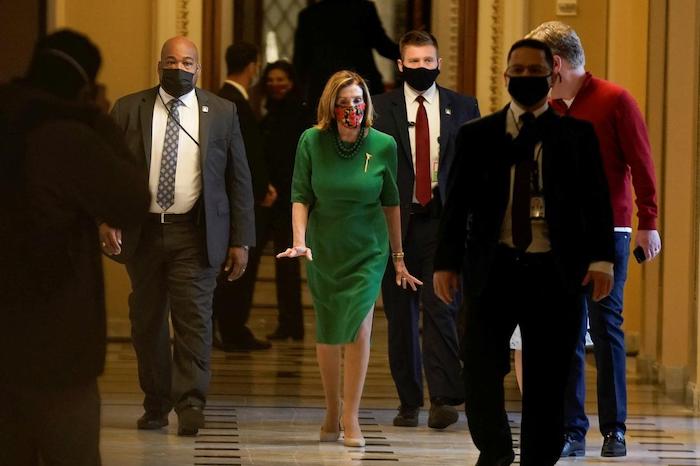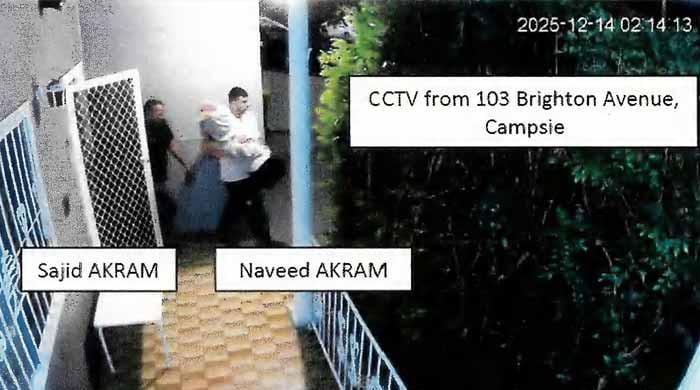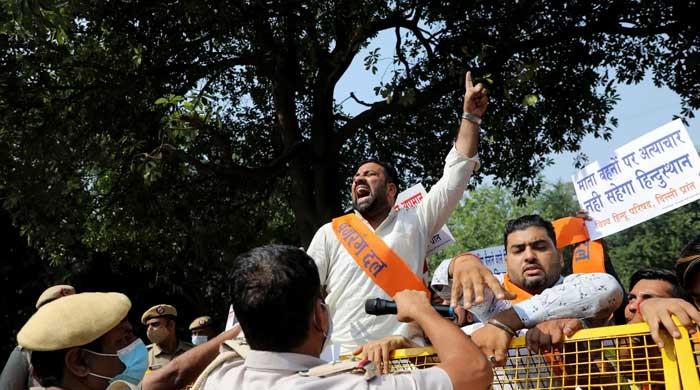US Congress approves $900b coronavirus aid bill
Bill sent to US President Donald Trump to sign
December 22, 2020

Speaker of the House Nancy Pelosi (D-CA) walks back to her office after opening the House floor following an agreement of a coronavirus disease (COVID-19) aid package the night before on Capitol Hill, Washington, DC. Photo: Reuters
- US House of Representatives, Senate pass the bill
- Aid bill sent to US President Donald Trump
- Scroll below for a summary of what is in the bill and what is not
WASHINGTON: After months of conflict, the United States Congress on Monday approved a $900 billion coronavirus aid bill attacked to the federal agency spending needed to avert a government shutdown at midnight when existing money expires.
The Democratic-controlled US House of Representatives approved the measure by a vote of 359-53 and the Senate voted 91-7 to send the bill to President Donald Trump who is expected to sign it.
Also read: US FDA to 'rapidly' approve Moderna vaccine for use after panel's approval
What is the relief package?
According to a summary released by House of Representatives Speaker Nancy Pelosi and Senate Democratic Leader Chuck Schumer, and interviews with several congressional aides who provided additional details:
Checks in the mail: The bill includes $166 billion in new direct payments of up to $600 per adult and child, for individuals making up to $75,000 a year and $1,200 for couples making up to $150,000 a year. The bill expands direct payments to mixed-status households.
More unemployment benefits: An additional $300 per week for some unemployment recipients, with expanded coverage to the self employed, “gig” workers and others in nontraditional situations.
A US Postal Service grant: Congress agrees to convert a $10 billion loan approved in March into direct funding for USPS without requiring repayment.
Payroll loans: $284 billion for government payroll loans, including expanded eligibility for nonprofits and newspaper and TV and radio broadcasters, $15 billion for live venues, independent movie theaters, and cultural institutions and $20 billion for targeted disaster grants
Back-to-school funding: $82 billion for colleges and schools, including for heating-and-cooling system upgrades to mitigate virus transmission and reopen classrooms, and $10 billion for childcare assistance. Includes $54.3 billion for K-12 schools and $22.7 billion for higher education
Childcare: $10 billion to provide childcare assistance to families and to help childcare providers cover costs related to pandemic safety.
Business meal write-offs: A new tax break for business meal expenses, nicknamed the “three martini” deduction.
Read more: US President-elect Joe Biden receives coronavirus vaccine
Ending surprise medical billing: Insured patients only need to pay in-network costs when an emergency or other issue forces them to use a medical provider who isn’t covered by their network.
Transport industry help: $45 billion for transportation aid, including $15 billion to US passenger airlines for payroll assistance, $14 billion for transit systems, $10 billion for state highway funding, $2 billion for airports, $1 billion for airline contractors and $1 billion for passenger railroad Amtrak.
Rent and eviction aid: $25 billion for rent and utility payment assistance for people struggling to stay in their homes, and an extension of the eviction moratorium until Jan. 31. States will receive a minimum of $200 million in assistance.
Vaccine distribution aid: $30 billion to support procurement and distribution of the vaccine, “ensuring it’s free and rapidly distributed to everyone,” as Schumer said.
More to fight hunger: $13 billion for food assistance, including additional funding for food banks and senior nutrition programs, college student access to the federal government’s Supplemental Nutrition Assistance Program.
Farm aid: Another $13 billion for direct payments, purchases and loans to farmers and ranchers.
Expanded Pell Grants: New grants for college tuition, which would reach 500,000 new recipients.
Internet access: $7 billion to give more Americans broadband internet access, including $1.9 billion to replace telecom network equipment that poses national security risks and $3.2 billion for a new temporary benefit program to help low-income Americans get access to broadband service
Global virus alliances: $4 billion for an international vaccine alliance
Tax credits: Enhanced tax credits to encourage low-income housing construction, businesses to keep employees on payroll, employers to provide paid sick leave, and for low income workers.
Minority-owned businesses: $12 billion for minority owned and very small businesses that struggled to access earlier Payroll Protection Program financing.
Read more: Moderna drug shows 100% efficacy against 'severe COVID-19'
What's not in the bill?
Liability protection for companies whose employees get coronavirus, which Republicans have backed for months, was not including in the final negotiations or bill; Democrats laid aside sizable funds for state and local governments in return.
A last-minute attempt by the Republican Party to limit the Federal Reserve’s emergency lending power to small businesses and local governments was also left out.









